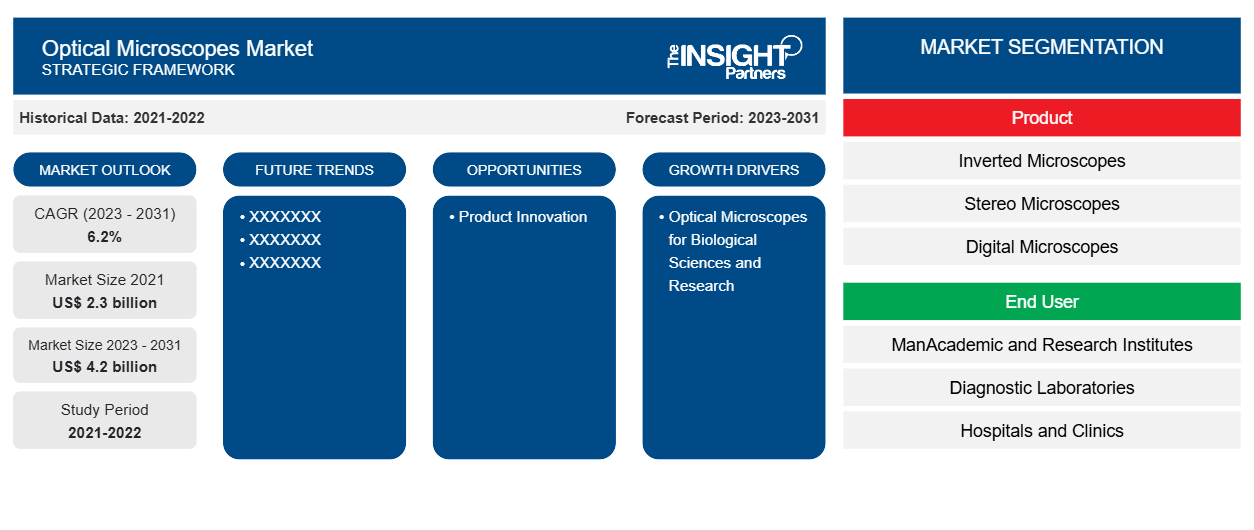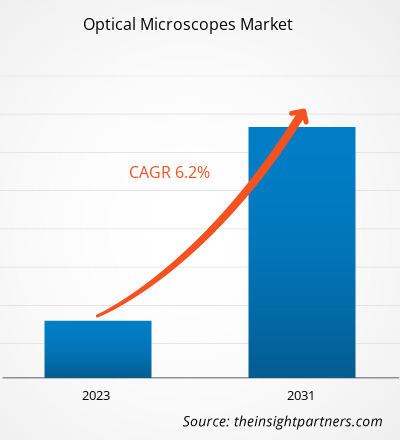Optical Microscopes Market Drivers and Forecasts by 2031
Optical Microscopes Market Size and Forecast (2021–2031), Global and Regional Share, Trend, and Growth Opportunity Analysis Report Coverage: By Product (Inverted Microscopes, Stereo Microscopes, Digital Microscopes, and Accessories), End User (Academic & Research Institutes, Diagnostic Laboratories, Hospitals & Clinics, Pharmaceutical & Biotechnology Companies), and Geography
Historic Data: 2021-2022 | Base Year: 2021 | Forecast Period: 2023-2031- Report Date : Apr 2026
- Report Code : TIPMD00002081
- Category : Life Sciences
- Status : Data Released
- Available Report Formats :


- No. of Pages : 150
The Optical Microscopes Market was valued at US$ 2.3 billion in 2021 and is expected to reach US$ 4.2 billion by 2031. The market is expected to register a CAGR of 6.2% from 2023–2031.
Technological advancements and strategic alliances in the market are likely to remain key Optical Microscopes Market trends.
Optical Microscopes Market Analysis
Optical Microscopes for Biological Sciences and Research
Advancements in biological sciences are connected with optical microscopes. An optical microscope can be used to observe eukaryotic cells including nuclei, mitochondria, and chloroplasts. Additionally, optical microscopes have visible electromagnetic radiation for diverse imaging applications in the fields of cell biology, biotechnology, life sciences, nanotechnology, and the examination of histopathology tissue sections for clinical diagnosis. Furthermore, manufacturers are developing innovative optical microscopes with high magnification and better visuality of biological samples. McConnell's novel optical microscopes for imaging large embryos and cell tissue through optical microscope’s “Sub-cellular Resolution” is a notable example. Therefore, advancements in optical microscopes with better imaging intended for biological sciences and research to meet the clinical needs of the patient are one of the most influential factors for market growth.
Optical Microscopes Market Overview
Technology, innovation, and smart technological solutions continue to influence optical microscopes market significantly. Optical microscopes for biological sciences and research and high optical microscopes magnification & resolution are the most impactful factors responsible for Optical Microscopes Market growth. Advancements in optical microscopes products is a key trend for Optical Microscopes Market growth. Product innovation will provide lucrative market opportunity for the Optical Microscopes Market growth.
Customize This Report To Suit Your Requirement
Get FREE CUSTOMIZATIONOptical Microscopes Market: Strategic Insights

-
Get Top Key Market Trends of this report.This FREE sample will include data analysis, ranging from market trends to estimates and forecasts.
Optical Microscopes Market Drivers and Opportunities
Introduction of Optical Microscopes With High Magnification & Resolution to Favor Market
For two decades, scientists have discovered that optical microscopes can be used to detect, track, and locate objects. However, today, the research department at the National Institutes of Standards and Technology (NIST) enables microscopes to measure nanometer-scale (NM) details with a high level of accuracy. For example, NIST developed a new calibration process that closely examines and corrects imaging errors. Also, the pioneering research won a 2014 Nobel Prize in Chemistry that has enabled research to track proteins in fertilized eggs, visualize molecules forming electrical connections between nerve cells in the brain, and study the nanoscale motion of miniature motors. Therefore, high optical microscopes magnification and resolution will contribute significantly driving the market growth.
Product Innovation– An Opportunity
Optical microscopy is an advanced microscope driving the progress in cell biology to obtain spatial and temporal resolution to detect living cells and tissues. Since the past, staining samples with fluorescent labels provided a highly sensitive method to visualize biomolecules. However, fluorescence microscopy has several limitations associated with staining samples, such as sample manipulation & staining artifacts, fluorophore photobleaching, and associated phototoxicity. Therefore, many efforts by the researchers have been devoted to develop label-free optical microscopy techniques that are capable to provide quantitative capabilities in optical microscopes that were previously unavailable with fluorescent microscopes. For example, the laboratories are developing quantitative label-free optical microscopes featuring innovative excitation/detection schemes across applications to detect synthetic lipid membranes and nanoparticle materials of living cells. Also, research laboratories are developing a new wide-field interferometric reflectometry method to monitor single-protein lipid membrane interactions with unprecedented sensitivity. Therefore, innovative product innovation will provide lucrative market opportunities in the coming years for optical microscopes market.
Optical Microscopes Market Report Segmentation Analysis
Key segments that contributed to the derivation of the Optical Microscopes Market analysis are candidature and services.
- Based on product, the Optical Microscopes Market is divided into inverted microscopes, stereo microscopes, digital microscopes, and accessories. The inverted microscopes segment may hold a larger market share in 2023.
- By end user, the market is segmented into academic & research institutes, diagnostic laboratories, hospitals & clinics, and pharmaceutical & biotechnology companies. The academic & research institutes segment may hold the largest share of the market in 2023.
Optical Microscopes Market Share Analysis by Geography
The geographic scope of the Optical Microscopes Market report is mainly divided into five regions: North America, Asia Pacific, Europe, Middle East & Africa, and South America/South & Central America.
North America has dominated the Optical Microscopes Market. In North America, US accounts considerable share for optical microscopes. The presence of top medical device companies present in the US and technologically advanced products are the most influential factors responsible for market growth. Asia Pacific is anticipated to grow with the highest CAGR in the coming years.
Optical Microscopes Market Regional Insights
The regional trends and factors influencing the Optical Microscopes Market throughout the forecast period have been thoroughly explained by the analysts at The Insight Partners. This section also discusses Optical Microscopes Market segments and geography across North America, Europe, Asia Pacific, Middle East and Africa, and South and Central America.
Optical Microscopes Market Report Scope
| Report Attribute | Details |
|---|---|
| Market size in 2021 | US$ 2.3 billion |
| Market Size by 2031 | US$ 4.2 billion |
| Global CAGR (2023 - 2031) | 6.2% |
| Historical Data | 2021-2022 |
| Forecast period | 2023-2031 |
| Segments Covered |
By Product
|
| Regions and Countries Covered |
North America
|
| Market leaders and key company profiles |
|
Optical Microscopes Market Players Density: Understanding Its Impact on Business Dynamics
The Optical Microscopes Market is growing rapidly, driven by increasing end-user demand due to factors such as evolving consumer preferences, technological advancements, and greater awareness of the product's benefits. As demand rises, businesses are expanding their offerings, innovating to meet consumer needs, and capitalizing on emerging trends, which further fuels market growth.

- Get the Optical Microscopes Market top key players overview
Optical Microscopes Market News and Recent Developments
The Optical Microscopes Market is evaluated by gathering qualitative and quantitative data post primary and secondary research, which includes important corporate publications, association data, and databases. The following is a list of developments in them market for Optical Microscopes and strategies:
- In April 2023, Nikon Corporation (Nikon) announced the development and launch of the digital imaging microscope "ECLIPSE Ui" as the first-ever microscope intended for medical use in Japan. ECLIPSE Ui has a unique design without an eyepiece lens, which improves the pathologist's observation posture and enables sharing of observation images on the display. The microscope contributes to reducing the physical burden on pathologists and the workflow of pathological observations.
Optical Microscopes Market Report Coverage and Deliverables
The “Optical Microscopes Market Size and Forecast (2021–2031)” report provides a detailed analysis of the market covering below areas:
- Market size and forecast at global, regional, and country levels for all the key market segments covered under the scope
- Market dynamics such as drivers, restraints, and key opportunities
- Key future trends
- Detailed PEST/Porter’s Five Forces and SWOT analysis
- Global and regional market analysis covering key market trends, major players, regulations, and recent market developments
- Industry landscape and competition analysis covering market concentration, heat map analysis, prominent players, and recent developments
- Detailed company profiles
Mrinal is a seasoned research analyst with over 8 years of experience in Life Sciences Market Intelligence and Consulting. With a strategic mindset and unwavering commitment to excellence, she has built deep expertise in pharmaceutical forecasting, market opportunity assessment, and developing industry benchmarks. Her work is anchored in delivering actionable insights that empower clients to make informed strategic decisions.
Mrinal’s core strength lies in translating complex quantitative datasets into meaningful business intelligence. Her analytical acumen is instrumental in shaping go-to-market (GTM) strategies and uncovering growth opportunities across the pharmaceutical and medical device sectors. As a trusted consultant, she consistently focuses on streamlining workflow processes and establishing best practices, thereby driving innovation and operational efficiency for her clients.
- Historical Analysis (2 Years), Base Year, Forecast (7 Years) with CAGR
- PEST and SWOT Analysis
- Market Size Value / Volume - Global, Regional, Country
- Industry and Competitive Landscape
- Excel Dataset
Recent Reports
Related Reports
Testimonials
The Insight Partners' SCADA System Market report is comprehensive, with valuable insights on current trends and future forecasts. The team was highly professional, responsive, and supportive throughout. We are very satisfied and highly recommend their services.
RAN KEDEM Partner, Reali Technologies LTDsI requested a report on a very specific software market and the team produced the report in a few days. The information was very relevant and well presented. I then requested some changes and additions to the report. The team was again very responsive and I got the final report in less than a week.
JEAN-HERVE JENN Chairman, Future AnalyticaWe worked with The Insight Partners for an important market study and forecast. They gave us clear insights into opportunities and risks, which helped shape our plans. Their research was easy to use and based on solid data. It helped us make smart, confident decisions. We highly recommend them.
PIYUSH NAGPAL Sr. Vice President, High Beam GlobalThe Insight Partners delivered insightful, well-structured market research with strong domain expertise. Their team was professional and responsive throughout. The user-friendly website made accessing industry reports seamless. We highly recommend them for reliable, high-quality research services
YUKIHIKO ADACHI CEO, Deep Blue, LLC.This is the first time I have purchased a market report from The Insight Partners.While I was unsure at first, I visited their web site and felt more comfortable to take the risk and purchase a market report.I am completely satisfied with the quality of the report and customer service. I had several questions and comments with the initial report, but after a couple of dialogs over email with their analyst I believe I have a report that I can use as input to our strategic planning process.Thank you so much for taking the extra time and making this a positive experience.I will definitely recommend your service to others and you will be my first call when we need further market data.
JOHN SUZUKI President and Chief Executive Officer, Board Director, BK TechnologiesI wish to appreciate your support and the professionalism you displayed in the course of attending to my request for information regarding to infectious disease IVD market in Nigeria. I appreciate your patience, your guidance, and the fact that you were willing to offer a discount, which eventually made it possible for us to close a deal. I look forward to engaging The Insight Partners in the future, all thanks to the impression you have created in me as a result of this first encounter.
DR CHIJIOKE ONYIA MANAGING DIRECTOR, PineCrest Healthcare Ltd.Reason to Buy
- Informed Decision-Making
- Understanding Market Dynamics
- Competitive Analysis
- Identifying Emerging Markets
- Customer Insights
- Market Forecasts
- Risk Mitigation
- Boosting Operational Efficiency
- Strategic Planning
- Investment Justification
- Tracking Industry Innovations
- Aligning with Regulatory Trends




















 Get Free Sample For
Get Free Sample For